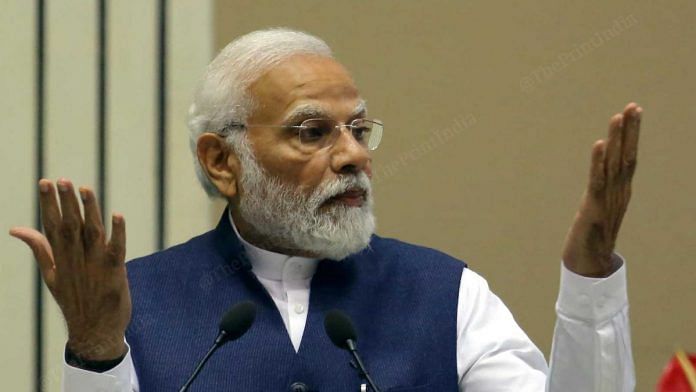There is a video on the Instagram page ‘NationwithNamo’, where we see Prime Minister Narendra Modi say that major policies are in the offing in his potential third term in office. These policies, he adds, reflect the views of 15,00,000 Indians whom he had consulted in different ways.
In another Instagram reel on the same page, a citizen aboard an auto rickshaw confidently declares his vote: “Modi”. What about the Opposition? “Bakwaas hai (it’s nonsense)”.
Heading for a third straight term in power, on the back of a trio of outstanding state assembly election victories, the thrust of the Bharatiya Janata Party’s 2024 election campaign is clear: one party, one election.
Navigating one-party dominance
One of the core arguments on which multi-party democracy stands is the idea of political parties as efficient mechanisms of aggregating interests in a diverse society. And the related idea that it takes at least two political parties for democracy to tango. This is because the interests that parties consolidate must be presented to the electorate as a cohesive policy agenda, which necessarily means that some interests will be excluded from a party’s manifesto to make it legible. And this is where the opposition party comes in. It gives voice and hope to all those interests that will inevitably be under-represented by the ruling party. It keeps them tethered to the system.
Now consider the figure of 15,00,000 quoted by Prime Minister Modi. There is no way to tell how this sample was selected. Was this an exercise in genuine democratic deliberation with a representative sample? Or was this an exercise in what scholars of authoritarianism call deliberative authoritarianism, where some contrary voices were heard with the intention to learn, but within pre-specified limits? Asking such questions is, of course, to miss the forest for the trees. The real magic in the figure of 15,00,000 lies elsewhere. Fifteen lakh is roughly 0.1 per cent of the size of India’s population and the unmistakable message being conveyed is this: If a disciplined Prime Minister at the vanguard of a disciplined political party has consulted 0.1 per cent of India’s population for policy suggestions, why does India need an Opposition at all?
A lot of ink has been spilt in recent times, including in the op-ed pages of ThePrint, lamenting how India is marching headlong into a national election whose outcome is known. There is some justification for this handwringing. The idea of a Lok Sabha election called in advance is simply anathema in the Indian context after the first two decades of Independence, barring exceptional situations (the Congress sweep of 1984, for example).
Now that a predictable election is upon us, it is worth asking: How should the Opposition navigate this new terrain where its very existence is a salient issue? To answer this question, it might help to engage in a bit of comparative reasoning and look at the experience of opposition parties in other one-party systems.
Also read:
Opposition politics in Turkey and beyond
Here, the case of Turkey’s opposition parties and how they responded to the phenomenon of the “Erdoganisation” of Turkish politics is particularly instructive. The story of the Turkish Opposition under the growing centralisation of power under President Recep Tayyip Erdogan is told in two parts. Part one lasts from 2002-2018 when it was hugely ineffective. Part two dates from 2019 onwards with Erdogan’s stunning loss in the Istanbul mayoral election.
Why is the period from 2002-2018 marked as the phase of “Opposition failure” in Turkish politics? And why did things turn around dramatically in 2019? The answer lies, at least in part, in a very important change in the way the Opposition campaigned in these two periods.
In the first period, Opposition leaders responded to the personalisation of politics under Erdogan by launching personal attacks on him such as calling him a ‘thief,’ ‘separatist,’ ‘dictator’ etc. While the strategy helped to consolidate their control over their respective parties, it also galvanised the pro-Erdogan constituency to stand even more firmly behind him. From 2019 onwards, however, the Opposition shifted its campaign focus to micro-level policy reforms: good governance, improvement of local economies and local transportation infrastructure, supportive policies for students and the elderly, promises of cheaper water and natural gas etc.
Of course, Turkey’s economic crisis – a function of Erdogan’s mismanagement – created the space for these options. However, keeping a razor-sharp focus on policy rather than personality enabled the Opposition to offer a genuine alternative to the Erdogan campaign, which stressed on macro-policy issues such as national survival, identity politics, and government security.
At the risk of over-stretching the comparative lens, consider the cases of Azerbaijan and Belarus. In both these cases, which are best described as electoral autocracies, the electoral part of electoral autocracy has been whittled down to the point where the Opposition is literally forced to operate out of ghettos. The Opposition has survived even in these most difficult of circumstances by switching to non-electoral mobilisation through media, lobbying, and educational activities.
It is not my case that India’s Opposition landscape looks anything remotely like Azerbaijan’s or Belarus’. My broader point is this: No matter how much the proclivity of democratically elected populist leaders to centralise political power, they are bound to leave some institutional opportunities for oppositional politics, even if circumscribed. This is crucial for their legitimacy because they simply do not have the capacity to maintain Chinese or Russian-style one-party states. And as long as such spaces for oppositional mobilisation are available, and as long as the Opposition is thoroughly committed to the cause of liberal democracy, it can find solace in the great Bob Marley’s beautiful words: “ ‘Tis who fight and run away, live to fight another day”.
Subhasish Ray is Professor and Associate Dean (Research) at the Jindal School of Government & Public Policy, O.P. Jindal Global University, Haryana; and an editor for the Journal of Genocide Research. He tweets @subhasish_ray75. Views are personal.
(Edited by Zoya Bhatti)



